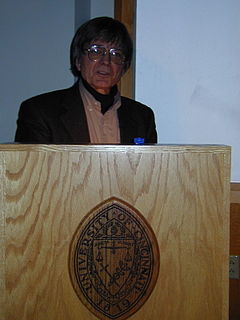- Robert Coover
-
"Coover" redirects here. For the inventor, see Harry Coover.

Born February 4, 1932
Charles City, Iowa, U.S.Occupation writer Nationality American Alma mater Indiana University Period 1960s- Genres short story, novel
Influenced- Mary Caponegro, Jacob Appel, Dave Eggers, Steven Millhauser, Ken Kalfus, Rick Moody, Jonathan Lethem
Robert Lowell Coover (born February 4, 1932) is an American author and professor in the Literary Arts program at Brown University. He is generally considered a writer of fabulation and metafiction.
Contents
Life and works
Coover was born in Charles City, Iowa. He attended Southern Illinois University Carbondale, received his B.A. in Slavic Studies from Indiana University in 1955, then served in the United States Navy. He received an M.A. in General Studies in the Humanities from the University of Chicago in 1965. In 1968, he signed the “Writers and Editors War Tax Protest” pledge, vowing to refuse tax payments in protest against the Vietnam War.[1] Coover has served as a teacher or writer in residence at many universities.
Coover's first novel was The Origin of the Brunists, in which the sole survivor of a mine disaster starts a religious cult. His second book, The Universal Baseball Association, Inc., J. Henry Waugh, Prop., deals with the role of the creator. The eponymous Waugh, a shy, lonely accountant, creates a baseball game in which rolls of the dice determine every play, and dreams up players to attach those results to.
Coover's best-known work, The Public Burning, deals with the case of Julius and Ethel Rosenberg in terms that have been called magic realism. Half of the book is devoted to the mythic hero Uncle Sam of tall tales, dealing with the equally fantastic Phantom, who represents international Communism. The alternate chapters portray the efforts of Richard Nixon to find what is really going on amidst the welter of narratives.
A later novella, Whatever Happened to Gloomy Gus of the Chicago Bears offers an alternate Nixon, one who is devoted to football and sex with the same doggedness with which he pursued political success in this reality. The theme anthology A Night at the Movies includes the story "You Must Remember This", a piece about Casablanca that features an explicit description of what Rick and Ilsa did when the camera wasn't on them. Pinocchio in Venice returns to mythical themes.
Coover is one of the founders of the Electronic Literature Organization. In 1987 he was chosen as the winner of the Rea Award for the Short Story. Coover is indeed one of the foremost short story writers of the postmodern period, as exemplified by the "Seven Exemplary Fictions" contained in his 1969 book Pricksongs and Descants, which has influenced a new generation of writers, notably Jayne Joso for the 2011 novel, Perfect Architect.
See also
Selected Bibliography
Novels
- The Origin of the Brunists (1966)
- The Universal Baseball Association, Inc., J. Henry Waugh, Prop. (1968)
- The Public Burning (1977), completed 1975[2]
- Gerald's Party (1986)
- A Night at the Movies or, You Must Remember This (1987) (themed anthology)
- Pinocchio in Venice (1991)
- John's Wife (1996)
- Ghost Town (1998)
- The Adventures of Lucky Pierre: Director's Cut (2002)
- Noir (2010)
Short stories, Novellas, Plays & Collections
- Pricksongs & Descants (1969) (collection)
- The Babysitter (1969) (short story)
- A Theological Position (1972) (plays)
- A Political Fable (1980) (novella)
- Spanking the Maid (1982) (novella)
- In Bed One Night & Other Brief Encounters (1983) (collection)
- Whatever Happened to Gloomy Gus of the Chicago Bears (1987) (novella)
- Dr. Chen's Amazing Adventure (1991) (novella)
- Briar Rose (1996) (novella)
- The Grand Hotels (of Joseph Cornell) (2002) (novella)
- Stepmother (2004) (novella)
- A Child Again (2005) (collection)
- "The Case of the Severed Hand" Harper's Magazine 317 [1898] (July 2008): 74-80
- "White-Bread Jesus" Harper's Magazine 317 [1903] (December 2008): 79-88
- "Going for a beer" The New Yorker (March 14, 2011)
- "Matinée" The New Yorker (July 25, 2011)
Non-Fiction
- The End of Books (1992) (essay)
References
- ^ “Writers and Editors War Tax Protest” January 30, 1968 New York Post
- ^ "the manuscript was completed in 1975" - http://books.google.co.uk/books?id=rCCbiO901XAC&pg=PA120&lpg=PA120&dq=coover+%22public+burning%22+%22completed+in%22&source=bl&ots=v75WTTyykx&sig=PStGlHpzFZkzpEjhEHgSQ94tiN4&hl=en&ei=xL5XTrfCOYbX8gPej6WYDA&sa=X&oi=book_result&ct=result&resnum=1&ved=0CBsQ6AEwAA
External links
- Faculty Home Page at Brown University
- "Robert Coover". Providencephoenix.com. http://www.providencephoenix.com/archive/books/99/04/01/COOVER.html. Retrieved 2011-08-19.– Interview
- IMDB
- The End of Books
- Rettberg, Scott. "A History of the Future of Narrative: Robert Coover on Vimeo". Vimeo.com. http://vimeo.com/1765099. Retrieved 2011-08-19.– Novelist Robert Coover's keynote address at the Electronic Literature in Europe seminar (elitineurope.net), September 13, 2008. Introduced by Scott Rettberg. Videography by Martin Arvebro.
Categories:- 1932 births
- Living people
- American novelists
- American short story writers
- American tax resisters
- Brown University faculty
- Guggenheim Fellows
- Members of the American Academy of Arts and Letters
- Electronic literature
- Writers from Iowa
- Writers from Rhode Island
- People from Providence, Rhode Island
- Indiana University alumni
- Iowa Writers' Workshop faculty
- Postmodern writers
Wikimedia Foundation. 2010.

